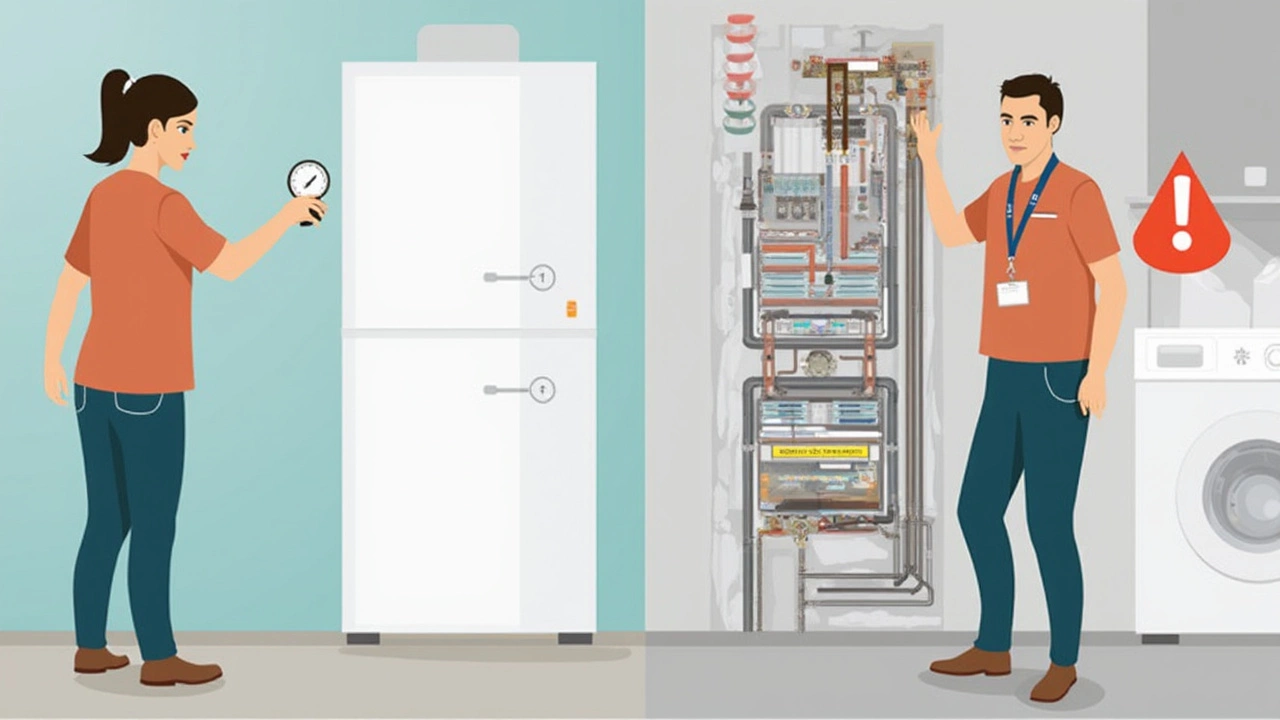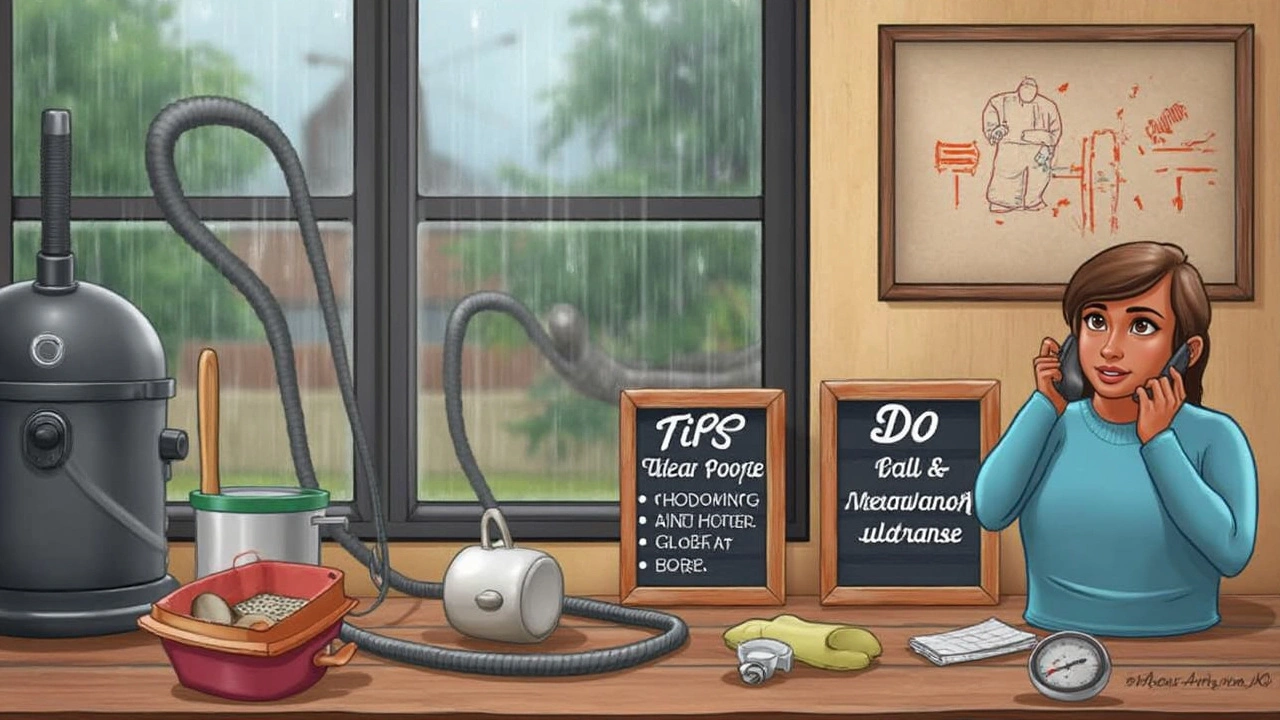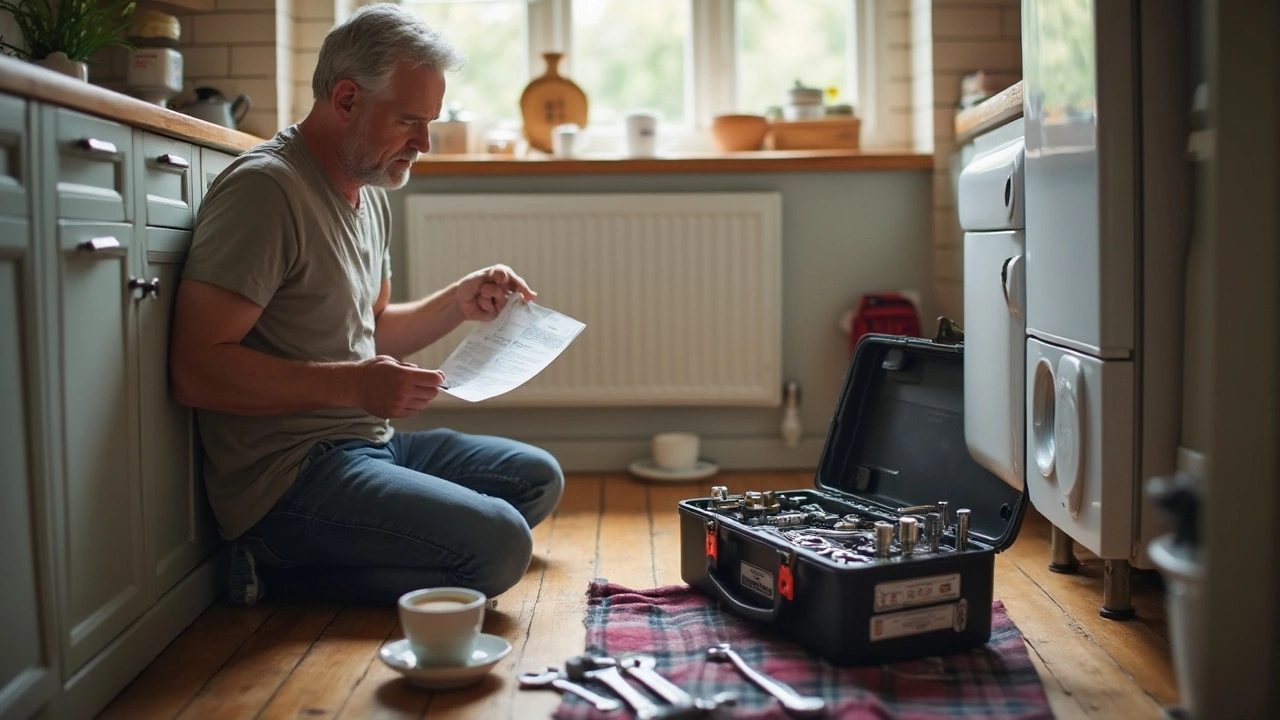Thinking about giving your boiler a little DIY love? It’s tempting, especially when a service visit feels expensive or you’re handy with a wrench. But before you grab your tools, there’s one thing you gotta know: messing around with your boiler isn’t always legal, and it can be risky for you (and your warranty).
Here’s the bottom line—UK law, for example, says only Gas Safe registered engineers can take the cover off and mess with the guts of most boilers. If you try to go deeper than the basics, you could end up with a fine or even put your home at risk of a gas leak or carbon monoxide poisoning.
That being said, there are some simple things you can safely handle yourself to keep things running smoothly. Not everything requires an expert, but you should know where the line is (before you cross it and end up making things worse!).
- The Legal Stuff: DIY Boiler Servicing Rules
- What You Can Actually Do Yourself
- Typical Mistakes People Make
- When You Need a Professional
- Homeowner Maintenance Hacks
The Legal Stuff: DIY Boiler Servicing Rules
Let’s get something straight: the law plays a big part in what you can and can’t do with your boiler. In the UK (as of 2025), if your boiler is gas-powered—which most homes have—only someone who’s officially Gas Safe registered can legally service or repair it. This means you can’t just open it up, start poking around, and call it a day.
The reason for these rules? Safety. Gas leaks and carbon monoxide can be deadly. According to the Health and Safety Executive, there are about 60 accidental carbon monoxide poisoning deaths every year in England and Wales. So it’s not just about ticking the right boxes—cutting corners can have serious consequences.
| Who Can Service Gas Boilers Legally? | Allowed Tasks |
|---|---|
| Gas Safe Registered Engineer | Full service, repairs, replacing parts, testing flue/gas tightness |
| Homeowner/DIY | Simple maintenance: pressure checks, bleeding radiators, visible inspection, topping up water |
Trying to save some cash? If you go beyond simple jobs, you’re not only risking your family’s safety, you could void your home insurance or even face fines. It gets stricter if you’re a landlord—there are yearly records, official inspections, and hefty penalties if things aren’t up to scratch.
- If you’re in a rented home, landlords must keep boilers serviced by law—DIY fixes aren’t allowed.
- If you own your home, you can handle basic maintenance, but not the inner workings.
- If your boiler is still under warranty, unauthorized work will usually make that warranty worthless.
Bottom line: Always check the guidebook for your boiler and stick to what you’re allowed. When in doubt, call a boiler repair pro. No one wants to learn about gas leaks the hard way.
What You Can Actually Do Yourself
So, you’re looking to roll up your sleeves and do some basic boiler maintenance. Good news—there are a few simple tasks most people can manage without breaking the law or voiding their warranty. The trick is sticking to small jobs on the outside of the boiler and avoiding anything to do with the gas or electrics.
Here’s what you can safely tackle yourself:
- Bleeding Radiators: If your radiators feel cold at the top but hot at the bottom, it’s usually air trapped inside. Grab a radiator key, slowly open the valve, and let the air escape. You’ll hear a hissing sound; close it once water starts coming out.
- Checking Pressure: Most boilers work best when the pressure sits between 1 and 1.5 bar. If it’s lower, you can top it up using the filling loop (there’s usually a simple tap for this). Just don’t overdo it—high pressure can also cause problems.
- Resetting the Boiler: If the boiler stops working, check for an obvious reset button. Sometimes a quick reset can fix simple faults, especially after a power cut.
- Cleaning the Exterior: Wipe down the outside of the boiler to keep dust and dirt out of vents and controls. Don’t take the cover off—just stick to easy-to-reach spots.
- Checking the Pilot Light: For older boilers, make sure the pilot light is steady and blue (not yellow or flickering). A weird flame color could mean it’s time to call in a pro.
Here’s a quick look at what’s usually safe to do and what’s a no-go without a pro:
| Task | DIY Allowed? |
|---|---|
| Bleeding radiators | Yes |
| Adjusting water pressure | Yes |
| Cleaning outside of boiler | Yes |
| Annual servicing (inside boiler) | No |
| Fixing leaks or replacing parts | No |
Stick to these basics and you’ll help your boiler repair bills stay low and your house warm. If you’re ever unsure, just double-check your boiler manual or play it safe by calling a Gas Safe registered engineer.

Typical Mistakes People Make
Boiler repair is one of those things that people think is easier than it actually is. A lot of folks make small errors that can cost big money or even cause dangerous problems. If you’re thinking of doing your own boiler maintenance, here are common mistakes you’ll want to avoid.
- Skipping the power shut-off. Sounds obvious, but some people forget to turn off the boiler’s power before poking around. That’s a fast way to short something out—or worse, get shocked.
- Messing with gas valves. Adjusting or loosening gas fittings on your own is never safe. One slip and you could cause a gas leak. The Gas Safe Register warns,
"Every year, thousands of people are put at risk by unqualified individuals trying to fix their own gas appliances."
- Neglecting to bleed radiators. Some try to fix poor heating by cranking up the pressure or fiddling inside the boiler. Often, simply bleeding the radiators would have solved it.
- Using the wrong pressure. Boilers need the pressure set just right—usually between 1.0 and 1.5 bar. Too much, and you could burst a pipe; too little, and you’ll have no hot water or poor heating.
- Forgetting the annual check. DIYers might skip the annual service, but that leads to higher breakdown risks and voided warranties in the UK. Not worth the gamble.
Here’s a look at some real numbers. According to a 2023 survey by Which? (the consumer group), they found:
| Mistake | Percentage of DIYers Affected |
|---|---|
| Incorrect pressure setting | 38% |
| Failed to bleed radiators | 26% |
| Attempted gas work | 11% |
| Missed annual check | 19% |
The bottom line? When it comes to boiler repair, there’s a thin line between saving money and causing a major headache. One tiny mistake can mean a costly callout or risk to your safety. If you’re ever unsure, get a professional to check things out.
When You Need a Professional
So, you’ve tightened a few screws and maybe even bled a radiator, but there are moments when picking up the phone is the only sensible move. If your boiler is making weird noises—like banging or whistling—that's not just annoying; it can be a sign of deeper problems such as a failing pump or scale buildup. A certified pro has the tools and training to spot what’s wrong right away.
If you ever smell gas, feel dizzy, or your carbon monoxide alarm goes off, get out of the house and call the emergency line immediately. Gas leaks and carbon monoxide are deadly, and this is absolutely not a DIY situation. Even if your boiler is just losing pressure constantly or keeps shutting itself off, it could be an issue with internal valves or electronics—a job strictly for a Gas Safe registered engineer. Messing with these can void your warranty, and you’ll risk breaking the law.
Here’s a list of specific problems where a professional is non-negotiable:
- Annual servicing for most modern boilers (often required to keep that warranty valid)
- Fixing leaks inside the boiler case
- Replacing or servicing gas valves, heat exchangers, or pressure sensors
- Diagnosing fault codes you don’t recognize
- Any work involving the gas supply or burner
According to UK government stats, around 60 people a year die from accidental carbon monoxide poisoning—and unsafe boiler repairs are a big part of the problem. That’s not a chance worth taking. Every year, insurance claims spike after winter for homes that skipped proper servicing, costing homeowners hundreds more in repairs.
| Issue | DIY Safe? | Requires Pro? |
|---|---|---|
| Bleeding radiators | Yes | No |
| Fixing leaks in boiler case | No | Yes |
| Annual boiler service (boiler repair) | No | Yes |
| Adjusting boiler pressure | Maybe* | Sometimes |
| Gas leak or carbon monoxide issues | No | Yes |
*Topping up pressure is generally okay as long as you follow the manual, but if it doesn’t solve the problem, call an engineer.
When in doubt, trust your gut and check the boiler manual. Most will tell you this stuff straight. If you’re ever unsure whether something crosses the DIY line, it usually does. Stay safe and let someone qualified take the heat.

Homeowner Maintenance Hacks
So, what can you actually do yourself to keep your boiler happy and avoid calling out a pro every five minutes? Good news: there’s loads you can handle without breaking the law or your boiler.
- Check the boiler pressure. Most home boilers like the pressure to sit between 1 and 2 bars when cold, usually marked on the pressure gauge. If it drops below or shoots over, you won’t get heat as you should. Topping up the pressure is something almost anyone can do—just follow your boiler manual. If the pressure keeps dropping, though, that’s one for a qualified engineer.
- Bleed your radiators. If your heating feels patchy or some rads are cold at the top, they probably need bleeding. Grab a radiator key, twist the bleed valve, and let the air out until water starts trickling. Got pets or kids? Keep them away while you work—hot water and air can spit out.
- Clear the area. Boilers hate clutter. Make sure there’s plenty of air around yours—boxed-in boilers or those surrounded by junk warm up badly and can even overheat.
- Check for leaks. Give your boiler and pipes a once-over every month or so. Damp spots, rust, or weird smells are all red flags. Small leaks can quickly become big repair bills if ignored.
- Reset the boiler. If it locks out or flashes an error, try the old trick: turn it off, wait, and restart. Many modern boilers have a reset button. If the fault keeps coming back, don’t go poking around inside—get a professional.
And here’s a bonus tip: every autumn, run your heating for an hour—even if it’s toasty outside. This wakes up your system, so you don’t get a nasty surprise when winter bites. These small jobs keep things ticking and help you spot problems before you get left in the cold.


